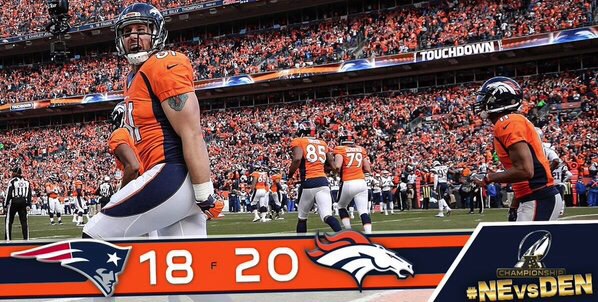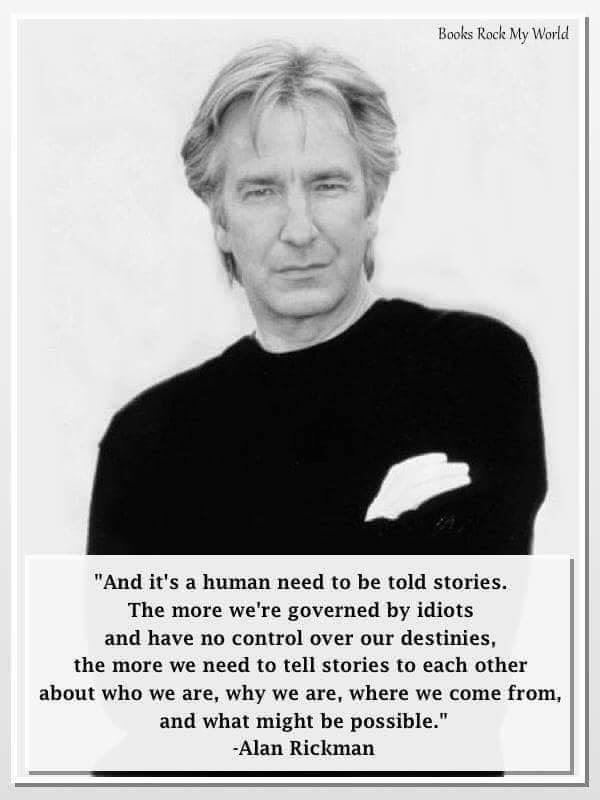Elder Bliss, Elder Scott, come here.
I was a 21 year old Mormon Missionary serving in Orange County, California. My companion, Elder Scott and I rented a room in the home of a young couple in the local congregation. Our landlady was ironing something in the living room as she watched TV. As missionaries, we didn’t normally watch TV. It was a little after 8:30 in the morning and we were preparing to head out for the day.
I don’t remember what we did that day. I don’t remember the name of the landlady. I don’t remember much at all about that day 30 years ago. I will never forget walking into that room and seeing the televised images of the beautiful blue sky, and the corkscrewing white trails from the rocket boosters.

Thrity years ago today, the Challenger space shuttle blew up, killing the seven astronauts, including Christy McAuliffe. She was not trained as an astronaut. She was a teacher. Her presence on the space shuttle that morning was an indication of how routine the trips had become. She was going to teach some classes from space. Millions of school kids were watching the launch live to wish her well.
It would be nearly three years before we put another shuttle into space. And we would never again take space flight for granted. My kids, like many other children around the United States attended an elementary school with a McAuliffe Space Center. The Space Center, as simply they called it, was a combination LARP (live action role play) and space simulator. They flew “missions.” They met “aliens.” They dealt with “disasters.” If they reacted successfully their mission was a success and they lived. If they failed, they “died.” They are older now and they remember the space center fondly. They do not remember it was the McAuliffe Space Center. And if they did, they wouldn’t remember who she was. We’ve had other disasters to mourn as a nation. The Columbia shuttle disaster in 2003 where we lost another seven astronaut hits. And of course, the events of September 11th, which while not involving the space program, was a time when the nation collectively grieved.
For those of us alive on that day 30 years ago today, the images will never fade, but we may need to occasionally be reminded of the faces.
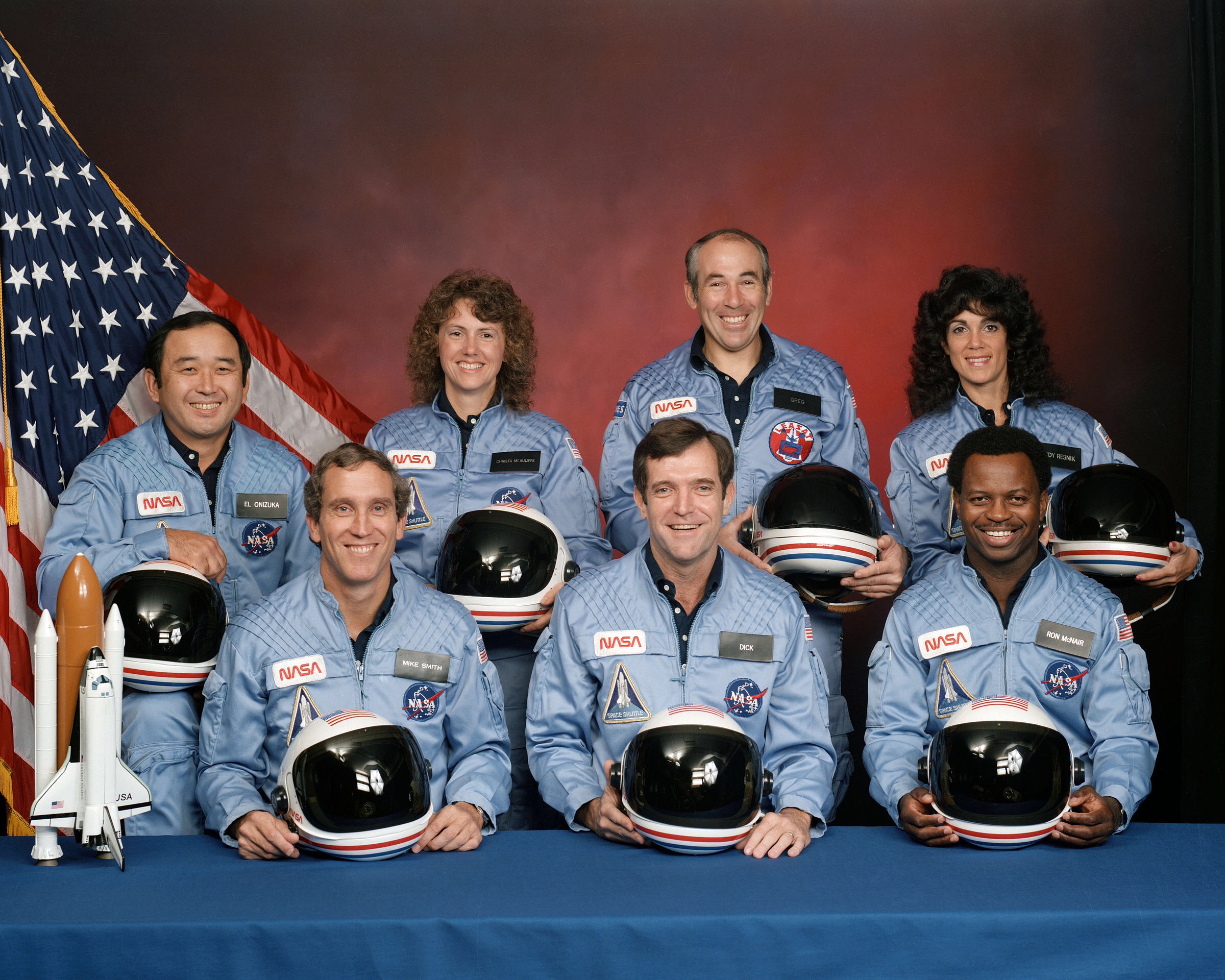
President Reagan was scheduled to deliver the State of the Union Speech on that night so many years ago. Instead he gave us one of the most moving speeches of the 20th Century, as he paid tribute to the challenger Seven.
Ladies and Gentlemen, I’d planned to speak to you tonight to report on the state of the Union, but the events of earlier today have led me to change those plans. Today is a day for mourning and remembering. Nancy and I are pained to the core by the tragedy of the shuttle Challenger. We know we share this pain with all of the people of our country. This is truly a national loss.
Nineteen years ago, almost to the day, we lost three astronauts in a terrible accident on the ground. But we’ve never lost an astronaut in flight. We’ve never had a tragedy like this.
And perhaps we’ve forgotten the courage it took for the crew of the shuttle. But they, the Challenger Seven, were aware of the dangers, but overcame them and did their jobs brilliantly. We mourn seven heroes: Michael Smith, Dick Scobee, Judith Resnik, Ronald McNair, Ellison Onizuka, Gregory Jarvis, and Christa McAuliffe.
We mourn their loss as a nation together.
For the families of the seven, we cannot bear, as you do, the full impact of this tragedy. But we feel the loss, and we’re thinking about you so very much. Your loved ones were daring and brave, and they had that special grace, that special spirit that says, “Give me a challenge, and I’ll meet it with joy.” They had a hunger to explore the universe and discover its truths. They wished to serve, and they did. They served all of us.
We’ve grown used to wonders in this century. It’s hard to dazzle us. But for twenty-five years the United States space program has been doing just that. We’ve grown used to the idea of space, and, perhaps we forget that we’ve only just begun. We’re still pioneers. They, the members of the Challenger crew, were pioneers.
And I want to say something to the schoolchildren of America who were watching the live coverage of the shuttle’s take-off. I know it’s hard to understand, but sometimes painful things like this happen. It’s all part of the process of exploration and discovery. It’s all part of taking a chance and expanding man’s horizons. The future doesn’t belong to the fainthearted; it belongs to the brave. The Challenger crew was pulling us into the future, and we’ll continue to follow them.
I’ve always had great faith in and respect for our space program. And what happened today does nothing to diminish it. We don’t hide our space program. We don’t keep secrets and cover things up. We do it all up front and in public. That’s the way freedom is, and we wouldn’t change it for a minute.
We’ll continue our quest in space. There will be more shuttle flights and more shuttle crews and, yes, more volunteers, more civilians, more teachers in space. Nothing ends here; our hopes and our journeys continue.
I want to add that I wish I could talk to every man and woman who works for NASA, or who worked on this mission and tell them: “Your dedication and professionalism have moved and impressed us for decades. And we know of your anguish. We share it.”
There’s a coincidence today. On this day three hundred and ninety years ago, the great explorer Sir Francis Drake died aboard ship off the coast of Panama. In his lifetime the great frontiers were the oceans, and a historian later said, “He lived by the sea, died on it, and was buried in it.” Well, today, we can say of the Challenger crew: Their dedication was, like Drake’s, complete.
The crew of the space shuttle Challenger honored us by the manner in which they lived their lives. We will never forget them, nor the last time we saw them, this morning, as they prepared for their journey and waved goodbye and “slipped the surly bonds of earth” to “touch the face of God.”
Thank you.
No, we will never forget them.
Rodney M Bliss is an author, columnist and IT Consultant. His blog updates every weekday at 7:00 AM Mountain Time. He lives in Pleasant Grove, UT with his lovely wife, thirteen children and grandchildren.
Follow him on
Twitter (@rodneymbliss)
Facebook (www.facebook.com/rbliss)
LinkedIn (www.LinkedIn.com/in/rbliss)
or email him at rbliss at msn dot com(c) 2016 Rodney M Bliss, all rights reserved
The winner of today’s best Toastmaster’s speech is Katey. Please join with me in congratulating her.
Yesterday I gave a speech at my Toastmasters club.
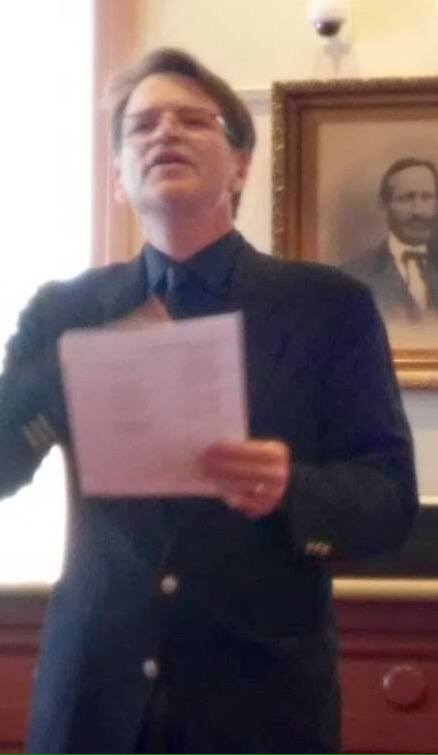
(Photo Credit: Olympic Orators Facebook Page)
Actually, it was a dramatic poetry reading. More on that in a minute. It went well. Toastmasters clubs really enjoy two things; applauding and voting. We applaud every thing. We applaud whenever someone walks to the front of the room. That happens four times in the first five minutes, and can happen as many as 15-20 times in an hour long meeting.
We also vote. . .a lot. We vote for best speech. We vote for the person who evaluated the speech the best. We vote for the best extemporaneous speaker during an event called Table Topics. Getting voted best doesn’t have any lasting meaning, but you do get a ribbon.
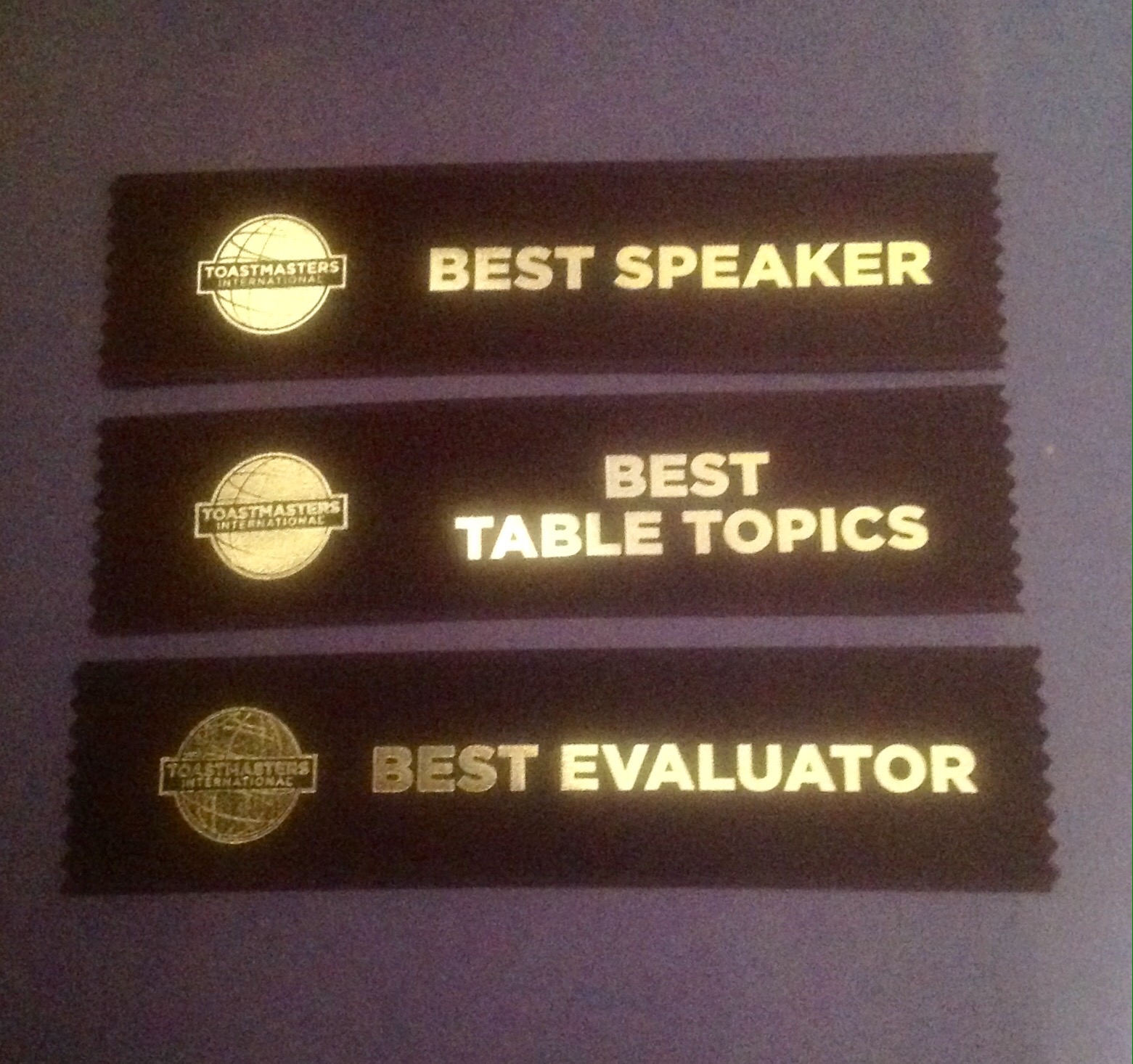
Generally a Toastmasters meeting will have three speakers. Each speaker will speak for anywher from 5-12 minutes depending on the speech. Mine today was scheduled for 6-8 minutes. I took 6:18. The club members clapped when I was done.
However, had I gone over time in my speech, had I taken longer than the allocated 6-8 minutes, I would be ineligible for the voting. In fact, one of the speakers yesterday went too long. He was out of the voting. It was between me and Katy. The winner gets a ribbon.
I think I gave the better speech. I voted for Katy. She won.
In Toastmasters you deliver five speeches on a particular theme. I’m working on the Interpretive Reading manual. Today’s assignment was to read a poem. I enjoy poetry. And I’ve always liked “The Charge Of The Light Brigade,” by Alfred, Lord Tennyson. It tells the story of a devastating cavalry charge by a British Light Cavalry brigade against entrenched Russian artillery positions. It’s a study in contrasts; the brave soldiers (Ours is not to wonder why. Ours is but to do and die) vs the incompetence that had led them there (the soldier knew someone had blunder’d.)
I read through it in about 3 minutes. With some dramatic pauses, I could maybe stretch that to four minutes, but nothing past that. But, while researching te poem and the Battle of Balaclava on which it was based, I discovered another poem. “The Last of The Light Brigade” is set 40 years after Tennyson’s 1854 poem. Rudyard Kipling wrote of the last remaining twenty soldiers from that terrible charge. The destitute men call on Tennyson to ask him to write a “to be continued” story. “You wrote that we were heroes once, sir. Please, write we are starving now.”
The two poems together we’re just over six minutes. Perfect. I would have time to pause in the reading without worrying about time. I hate the idea of going long. I practiced both poems several times before yesterday’s noon meeting. Interpretive reading is designed to be read, not memorized. I felt well prepared. I was the first speaker.
I was struck by my reaction to the words written so many years ago about a battlefield that I honestly couldn’t find on a map. My pauses went from being scripted to being genuine efforts to compose myself as I described first the astounding sacrifice and then the harrowing deprivation of these men dead more than a century ago. The cracks in my voice were real. The performance was one of my best.
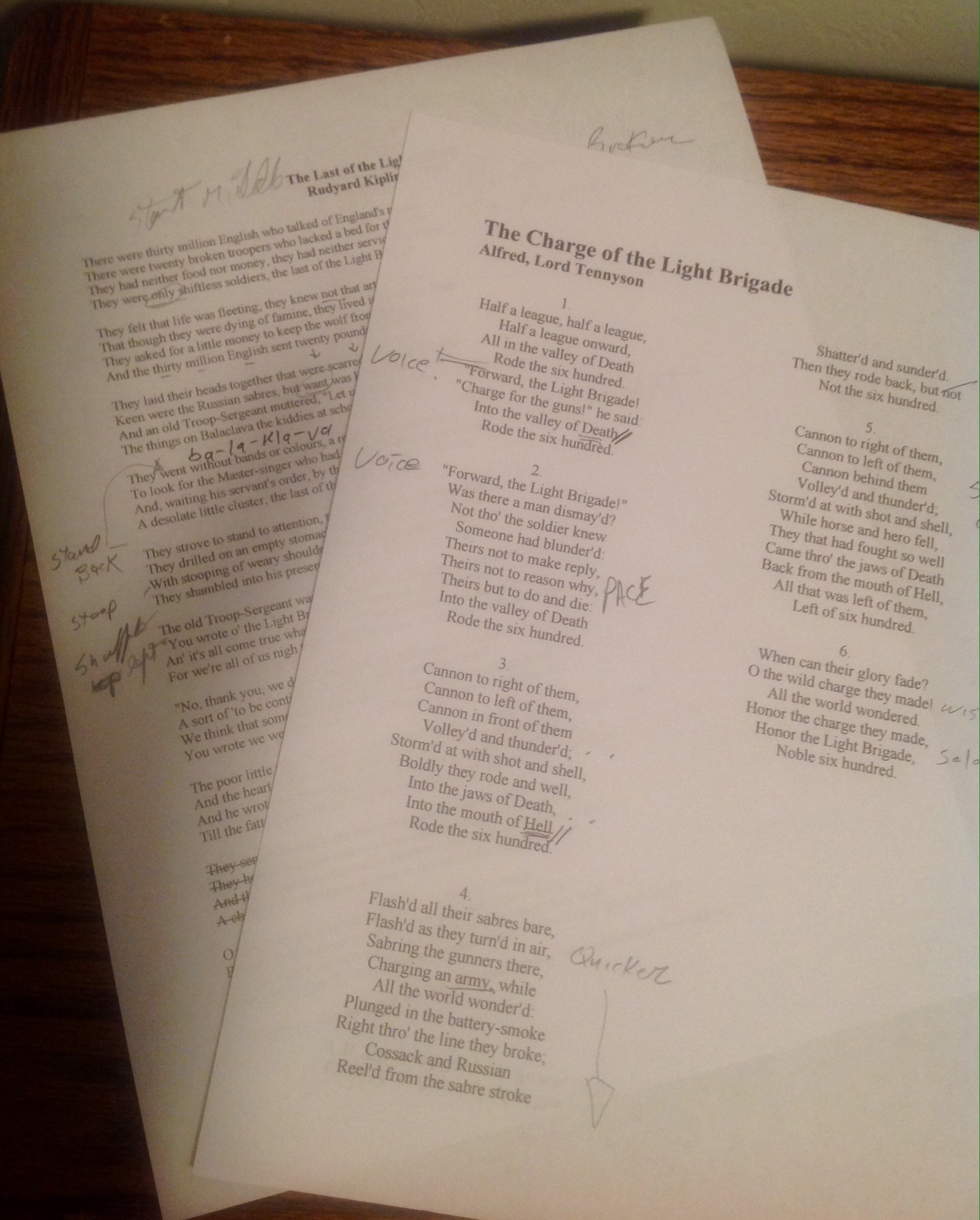
Katy did a wonderful presentation on how to comfort so who are suffering. Her voice didn’t crack. She didn’t have any purposeful pauses. When it came time to vote, I felt I’d done a better job. I still voted for Katy, because I always vote for the other speaker. I rarely even vote for the person who evaluates my speech for best evaluator.
I don’t know what the results of the voting were. By that I mean I don’t know how many votes Katy beat me by. But, had I lost by a single vote, I would not have regretted my vote.
It’s a poor performer who is his own cheerleader.
If I have done my preparation correctly, I should always think I deserved best speaker. Why wouldn’t I? I understand the work that went into my performance. I know about the rough drafts, the efforts to tease out the emotion in a text. I know the depth and energy I put into it. I don’t understand that about anyone else. I am judging not only my performance, but my preparation. Evaluated against someone else’s performance, my perception is biased.
And I enjoy winning. No doubt about it. I was disappointed when Katy’s name was ready. But, I don’t want to be rewarded by default. I want to be the best speech of the day. I give speeches to entertain. Today more than most days was a performance. The ribbon doesn’t make any difference to how well I perform. The ribbon is handed out afterward. My winning it or not winning it has no reflection on my speech.
Knowing my vote is going to the other speaker makes me that much more determined to do well. Like spotting someone 1 point at the start of the game., I want to make sure that if the club picks me, I know I earned it. If I don’t win, I know that I can get better. I’m speaking next week again.
Time to get better.
Rodney M Bliss is an author, columnist and IT Consultant. His blog updates every weekday at 7:00 AM Mountain Time. He lives in Pleasant Grove, UT with his lovely wife, thirteen children and grandchildren.
Follow him on
Twitter (@rodneymbliss)
Facebook (www.facebook.com/rbliss)
LinkedIn (www.LinkedIn.com/in/rbliss)
or email him at rbliss at msn dot com(c) 2016 Rodney M Bliss, all rights reserved
Here are the poems
The Charge of the Light Brigade
Alfred, Lord Tennyson (1854)
1.
Half a league, half a league,
Half a league onward,
All in the valley of Death
Rode the six hundred.
“Forward, the Light Brigade!
“Charge for the guns!” he said:
Into the valley of Death
Rode the six hundred.
2.
“Forward, the Light Brigade!”
Was there a man dismay’d?
Not tho’ the soldier knew
Someone had blunder’d:
Theirs not to make reply,
Theirs not to reason why,
Theirs but to do and die:
Into the valley of Death
Rode the six hundred.
3.
Cannon to right of them,
Cannon to left of them,
Cannon in front of them
Volley’d and thunder’d;
Storm’d at with shot and shell,
Boldly they rode and well,
Into the jaws of Death,
Into the mouth of Hell
Rode the six hundred.
4.
Flash’d all their sabres bare,
Flash’d as they turn’d in air,
Sabring the gunners there,
Charging an army, while
All the world wonder’d:
Plunged in the battery-smoke
Right thro’ the line they broke;
Cossack and Russian
Reel’d from the sabre stroke
Shatter’d and sunder’d.
Then they rode back, but not
Not the six hundred.
5.
Cannon to right of them,
Cannon to left of them,
Cannon behind them
Volley’d and thunder’d;
Storm’d at with shot and shell,
While horse and hero fell,
They that had fought so well
Came thro’ the jaws of Death
Back from the mouth of Hell,
All that was left of them,
Left of six hundred.
6.
When can their glory fade?
O the wild charge they made!
All the world wondered.
Honor the charge they made,
Honor the Light Brigade,
The Last of the Light Brigade
Rudyard Kipling (1890)
There were thirty million English who talked of England’s might,
There were twenty broken troopers who lacked a bed for the night.
They had neither food nor money, they had neither service nor trade;
They were only shiftless soldiers, the last of the Light Brigade.
They felt that life was fleeting; they knew not that art was long,
That though they were dying of famine, they lived in deathless song.
They asked for a little money to keep the wolf from the door;
And the thirty million English sent twenty pounds and four!
They laid their heads together that were scarred and lined and grey;
Keen were the Russian sabres, but want was keener than they;
And an old Troop-Sergeant muttered, “Let us go to the man who writes
The things on Balaclava the kiddies at school recites.”
They went without bands or colours, a regiment ten-file strong,
To look for the Master-singer who had crowned them all in his song;
And, waiting his servant’s order, by the garden gate they stayed,
A desolate little cluster, the last of the Light Brigade.
They strove to stand to attention, to straighten the toil-bowed back;
They drilled on an empty stomach, the loose-knit files fell slack;
With stooping of weary shoulders, in garments tattered and frayed,
They shambled into his presence, the last of the Light Brigade.
The old Troop-Sergeant was spokesman, and “Beggin’ your pardon,” he said,
“You wrote o’ the Light Brigade, sir. Here’s all that isn’t dead.
An’ it’s all come true what you wrote, sir, regardin’ the mouth of hell;
For we’re all of us nigh to the workhouse, an’ we thought we’d call an’ tell.
“No, thank you, we don’t want food, sir; but couldn’t you take an’ write
A sort of ‘to be continued’ and ‘see next page’ o’ the fight?
We think that someone has blundered, an’ couldn’t you tell ’em how?
You wrote we were heroes once, sir. Please, write we are starving now.”
The poor little army departed, limping and lean and forlorn.
And the heart of the Master-singer grew hot with “the scorn of scorn.”
And he wrote for them wonderful verses that swept the land like flame,
Till the fatted souls of the English were scourged with the thing called Shame.
O thirty million English that babble of England’s might,
Behold there are twenty heroes who lack their food to-night;
Our children’s children are lisping to “honour the charge they made – ”
And we leave to the streets and the workhouse the charge of the Light Brigade!
Darren, I heard you guys closed your call center in Virginia.
Yeah, the storm was just too much.
You know, it snowed in Utah too. Of course, we have to go to work when it snows.
You might have heard it snowed a little in the eastern part of the United States last week. My company has facilities in Kentucky and Virginia. Kentucky took a glancing blow, but our Virginia facility got hit pretty hard. We were closed for a couple of days.
It snows in Utah and we tend to think of ourselves as used to it. But, it’s like saying, I’m a skilled kayaker, therefore I should be able to sail a small boat. I mean, both are vessels that sit on the water, right? On Christmas Eve, we got about 18″ of snow. That’s less than shut down our Virginia facility. Wimps.
Not quite.
We had a snow storm come through Utah over this past weekend. It dropped about 3″ in my neighborhood Saturday night. Sunday, was a busy day for us. We were attending a local church conference, (called a Stake Conference for LDS readers.) One of my daughters was singing in a youth choir and had to be at the church at 6:40AM to practice. I knew I’d be taking the rest of the kids to the youth portion of the conference at 7:15, so I shoveled the driveway while warming up the van to take the early morning singer.
I made it about 2 blocks. This was not our normal powdery snow. This stuff was heavy, wet and very, very slick.
Ah. . .we’re going to have to go back and switch cars. There’s no way I could get the van up the hill into the church parking lot.
Our van is rear wheel drive and has standard tires. My Lexus is front wheel drive and has snow tires. The trip back and forth to the church was actually kind of fun, if you enjoy drifting around corners and doing an ebrake power slide in the snow covered parking lot.

At 7:15 I was back in my car taking the first group of youth to the church.
Hey Dad, can Paul have a ride? He wants to go but doesn’t have a way to get there.
Doesn’t he live up on Canyon View Drive?
Yeah.
Well, I hope the plows have hit his street. It’s kind of steep.
More drifting, More spinning tires. More appreciation for plow and sand trucks. Two more trips in the small car and everyone got there safely. At 9:00 it was two more trips back and forth to ferry the kids back, except for the singer who was staying for yet another practice for the adult choir. We made another detour to Canyon View Dr to drop off Paul.
The general session of conference was scheduled for 10:00. By that time three important things had happened. It had quit snowing. The snowplows had been by several times, moving snow and laying down sand. And the sun had started to poke through the clouds. The roads were to the point that we trusted ourselves to the van.
The three inches we got over the weekend was worse than the foot and a half we got at Christmas. And that’s where the comparisons with Utah and the East coast come into play. Our snow is not like their snow. Utah is a desert. It sounds almost like a contradiction to talk about snowstorms in a desert. But, Utah gets about 12″ of “rainfall” per year. Typically 10 inches of snow is the equivalent of an inch of rain. That number can vary from 15:1 if it’s cold down to 5:1 if it’s warm.
Utah has the greatest snow on earth. (It’s true, we even wrote that on the license plates.)
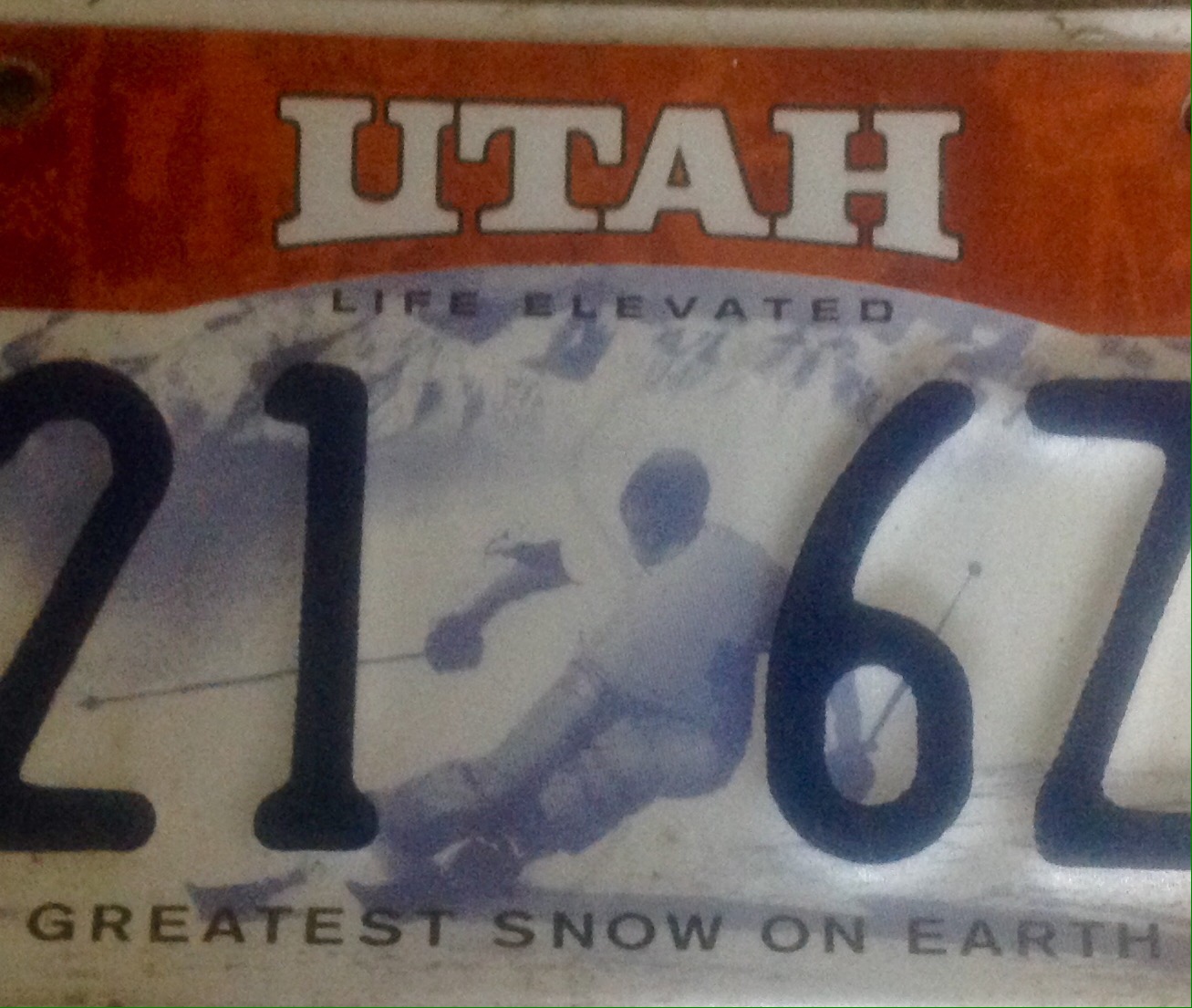
By the time Pacific storms arrive in Utah, the are cold and our low humidity means we get “dry” snow, also known as powder. My kids have sometimes swept our sidewalks rather than try to shovel an inch of puffy snow feathers. Our Chirstmas storm dumped 18″ of powder. Even my smallest kids had no trouble moving entire shovelfuls. It was about 25 degrees on Christmas

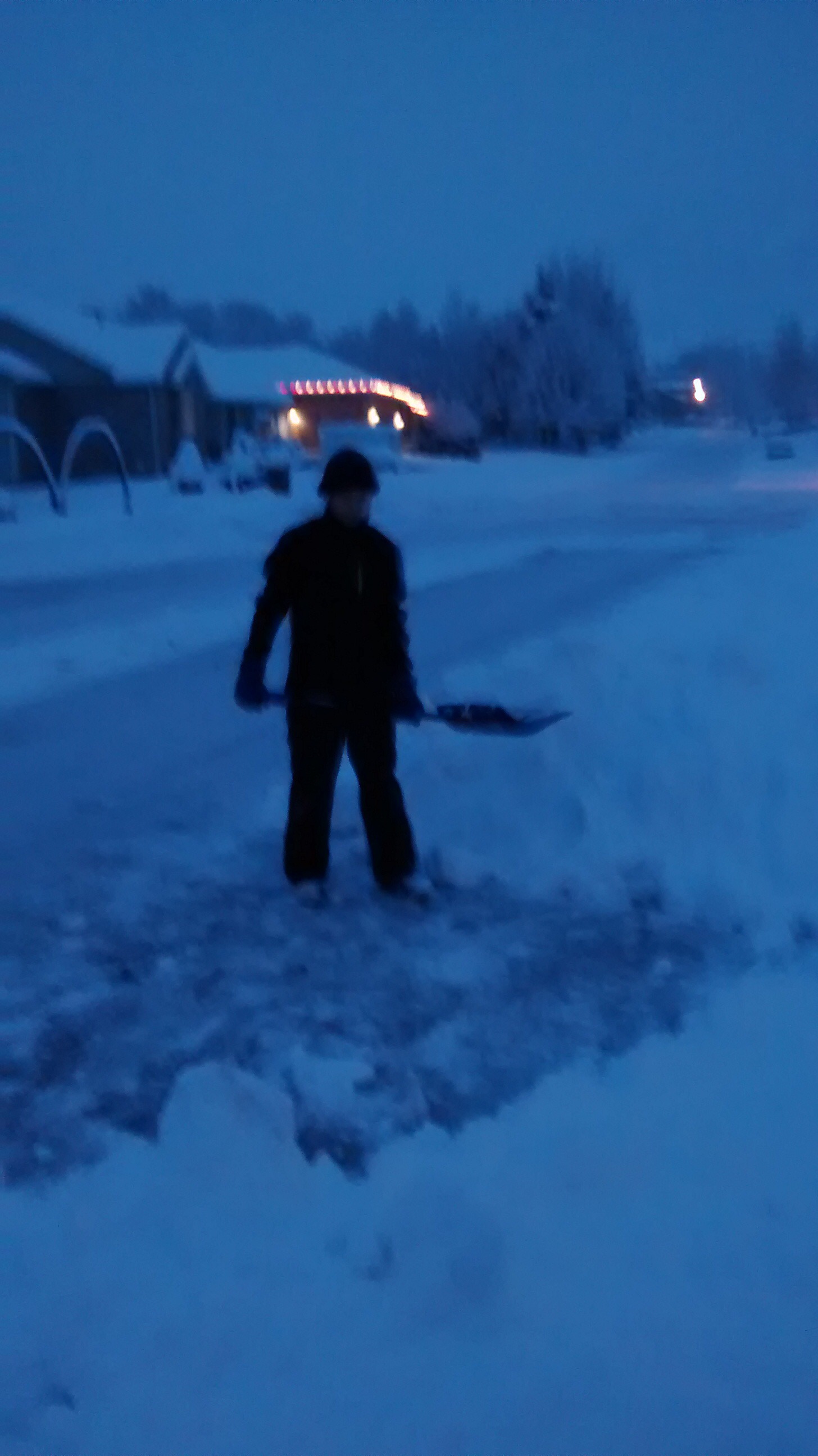 On Sunday the temperature was hovering right around 32 degrees. The snow we got was thick. And that’s what the storms on the East often bring, wet, heavy, slick snow.
On Sunday the temperature was hovering right around 32 degrees. The snow we got was thick. And that’s what the storms on the East often bring, wet, heavy, slick snow.
“Anything I don’t understand must be simple.”
– Dilbert’s Pointy Haired Boss –
We tend to see the world as a reflection of our own experiences. I live in Utah. We get 60″ of snow on average. We laugh at anything less than 6″. It’s hardly worth shoveling. But, just a slight change in temperature, and a couple of inches of “east coast” type snow and we are right there with the Virginia drivers, struggling to make it up the smallest hills. . .at least until the snowplows come by.
Rodney M Bliss is an author, columnist and IT Consultant. His blog updates every weekday at 7:00 AM Mountain Time. He lives in Pleasant Grove, UT with his lovely wife, thirteen children and grandchildren.
Follow him on
Twitter (@rodneymbliss)
Facebook (www.facebook.com/rbliss)
LinkedIn (www.LinkedIn.com/in/rbliss)
or email him at rbliss at msn dot com(c) 2016 Rodney M Bliss, all rights reserved
:12 seconds left on the clock. The score was 18-20. So, an exciting twelve seconds? Not so much. Peyton Manning, the Broncos’ quarterback took a knee and let the clock run out.
If you’re not a football fan, it might be hard to understand. The Broncos were in the lead. They simply ran out the clock for the win. Once they hiked the ball they didn’t have to run another play. So, Manning downed the ball immediately and the clock ran out. This is actually where both teams try to get to during the game. They want to have the lead and the ball with the ability to run out the clock without running plays.
(Photo credit: CBS Sports)
It made me think about how the game is played. In fact, how any game is played. Suppose instead of twelve seconds, the Broncos had been able to take a knee for the final minute? It’s a good move if you’re in the lead. What about five minutes? It’s impossible given the current rules of football, but suppose the rules allowed it? Would the winning team be willing to kill five minutes on the clock?
The NBA shot clock was instituted to prevent just that in basketball. The worst case of a team killing the clock was November 22, 1950. The Fort Wayne Pistons beat the Minneapolis Lakers. Then final score was 19-18. The Pistons held the ball for minutes at a time. They didn’t want to play. They wanted to win. And they did.
Is there a limit? If you were a Broncos fan how much time would you be willing for your team to kill to secure a win? At the end of three quarters the Broncos were leading 17-12. If you had the ability would you have wiped out the fourth quarter? At half time it was 17-9 in favor of Denver. Given the choice would you have had them head into the locker room for half time and not come back? Even at the end of the first quarter the Broncos were up 7-6 (on a missed extra point. That IS rare.) Remember the winner goes to the Super Bowl to play for the championship. Would you skip the final 45 minutes if your team was winning after 15?
I think this is part of the reason I like baseball. No matter the score, baseball plays all 27 outs. The team that is ahead by 2 runs in the 9th inning still needs to play tough defense and get the final outs.
Now imagine you are one of the fans who paid hundreds of dollars for a ticket to yesterday’s game. Would you consider it worth the money if your team won but you only got to see them play one quarter of football? Don’t get me wrong. The Broncos did the right thing on Sunday. They’d played well for 59:48. Their was nothing to gain and everything to lose by running a play during that last possession. But, how often do we accept less than a complete experience to get the results we want?
I have friends who are athletes. Some of my friends run ultra-marathons. They might run a 100 mile race in a day. Or, they might run a 300 mile relay race over 3 days. My friends are not the fastest athletes in their races. They don’t race for a win. They race for a finish. Finishing is a win. If you asked them if they’d prefer to simply get the t-shirt and medal without running the race, they’d think you were crazy. In fact, if you told them that they were not going to get the t-shirt or the medal, they would race anyway. If you told them that there would be no press, no one at the finish line, they’d still run. They value the experience.
Think about the Patriots, the team that Denver beat yesterday. They scored a touchdown with :13 left on the clock. They tried for a 2 point conversion and missed. The onside kick was recovered by Denver. If you were a Patriots fan would you have liked to see another minute added to the clock? Just enough to get the ball back and give Tom Brady and company one more shot at the end zone? Suppose that after a minute they were still behind. Would you want them to have more time? How much? Would you like to see them continue to play until the Patriots took the lead and then end the game at that point? The game is sixty minutes long, but if your team needed 65 minutes would you change the clock? Is there a limit? An extra 5 minutes? Ten? A full quarter?
You’d probably want to give your team as long as they needed to win, right? But, is that any more acceptable than shortening the game to try to preserve a win? A football game is sixty minutes long. If you could lengthen or shorten the game to help your team win, what are you winning? Is the final score with your team on top the ultimate goal?
In business we see this with a temptation to bend the rules. To take advantage, if you can do it without getting caught. Or, it’s an effort to evade responsibility. I’ve worked with numerous teams where the number one goals was to avoid screwing up. They absolutely did not want to be the team that made a mistake. But, if they are never making mistakes, they aren’t really taking chances. I’m guessing that if you asked professional football players if they would rather play a single quarter and guarantee a win, or play four quarters and risk a loss, they’d opt to play the entire game.
No one wants to make mistakes. My teams didn’t. But, every team makes mistakes. And a mistake is an opportunity to learn. An opportunity to identify a broken process and fix it. And when it comes down to it, your mistakes are the things that can define you. Anyone can be gracious, confident, professional when things are going smoothly. It’s when things go South that you show people the kind of person you really are.
Don’t be afraid to make a mistake. Don’t cut the game short to secure a hollow victory, or add time on the clock to give you that “one more shot.” Don’t try to make mistakes , but when they happen, own them and learn from them. And go ahead and take a knee during the last twelve seconds when you have a lead. I mean, THAT is just good football.
Rodney M Bliss is an author, columnist and IT Consultant. His blog updates every weekday at 7:00 AM Mountain Time. He lives in Pleasant Grove, UT with his lovely wife, thirteen children and grandchildren.
Follow him on
Twitter (@rodneymbliss)
Facebook (www.facebook.com/rbliss)
LinkedIn (www.LinkedIn.com/in/rbliss)
or email him at rbliss at msn dot com(c) 2016 Rodney M Bliss, all rights reserved
This is an article I wrote a couple of years ago about what it’s like to be a white parent of a black child in Utah. I’ve posted this before. With the recent discussion about the Oscar nominations excluding any black actors, I have been thinking about this topic more recently.
This is reprinted from the October 8, 2014 edition of the Timpanogos Times.
==========================================================
Bliss Bits
An Uncomfortable Conversation About Race
Rodney Bliss
There was a shooting in Saratoga Springs, UT in September 2014. Darius Hunt, a young black man was shot by police while he was carrying a ceremonial samurai sword. The case has garnered national attention. The investigation is ongoing.
There were two other shooting the same week. Men fleeing from the police who actually shot at the cops. One of the biggest differences in the stories is the other two men were white.
The death of Darius Hunt scares me.
I have two sons who are black. They are not yet teenagers. They don’t understand how the color of their skin will cause some people to treat them differently. Before too long I will have to have what Pleasant Grove, UT resident and former state legislator Holly Richardson, who also has black sons calls “The Talk.” Not a talk about sex. A talk about how young black men have to behave differently than their peers when interacting with the police.
A friend of mine posted a question for me “What is it like to be black in America?” to a private discussion group. She shared the results with me. One writer’s account stuck with me.
To be a Black man in America. I got pulled over last night by the police. My tail lights were out. I didn’t know.
As the white officer approached I followed some black-male-surviving-a-police-encounter rules I’ve learned to live by.
1] Keep BOTH HANDS visible and on the steering wheel.
2] Answer when addressed.
3] Be polite, and respectful, but firm & straightforward.
4] When asked for licence tell, without moving hands, “Its in wallet in pants pocket.” Wait until told to reach for it.
5] Same for proof of insurance: “It’s in glove box.” Indicate with nod of head.
6] Move to reach for it when told only.
At this point the officer usually goes to squad car to run plates & licence.
At this point survival for me has been achieved.
Tell him that.
It would be nice to think that we don’t have a race issue in our state, or our city. My wife and I enjoy raising a multiracial family here. (We also have white children and Asian children.) A few years ago we moved from one part of Pleasant Grove, down by the Linden WalMart to the east end of Center Street. It meant our children moved elementary schools. We planned our move so that it happened during the summer.
At the start of the next school year, my daughter’s 6th grade class announced they would take nominations for a class representative to the student council. My 11 year old was very excited to tell me that she intended to try to become her class representative.
“That’s great, honey.” I was happy that my daughter was willing to try new things. I was also worried about her being disappointed. She was one of the top three vote getters in the first round. She prepared a speech for the final day of voting. Coming home she couldn’t wait to tell me about it.
Daddy, guess what?
What?
I WON!
As a parent I was relieved that my kids attended a school where the new girl who was black could be elected by her peers.
In fact, Utah in general is known as a very racially tolerant state. We moved here several years ago from the Seattle area. There was a certain amount of apprehension, moving our multi-racial family from Seattle, a city known for its diversity, to Utah, a state known for being very conservative, very white and very Mormon.
And yet, when we arrived, it turned out our neighbor was of Asian descent. We went to church with Tongans and Samoans. A Spanish branch of the Mormon church met in the same building we met in. True there were not a lot of black people, but there were certainly a lot of people of color.
Given those positive experiences, it’s easy to think that we don’t have to worry about race in Pleasant Grove. I haven’t seen it. Many of the people in my neighborhood haven’t seen racism in our community.
However, the death of Darius Hunt reminds us that race still plays a role in Utah. We do not know if race was a factor in his death. We certainly know that race has been a factor in the discussions in the days since his death. In addition to Holly Richardson’s stories of how her adult black children are treated differently by police than her white children, I have heard from other friends in Utah who are black.
Rodney, did you think it didn’t exist? Did you think I was making it up? Every day. Every day I’m reminded that I’m black in a state that is mostly white.
Here’s why Darius’ death, in addition to being tragic, scares me. As you can see from the picture at the top of this column, I’m white. My wife is white. How do I teach my children? How do I teach my boys who are black to be confident, strong men, but to not do anything during an interaction with the police that might be considered threatening? How do I prepare them to be followed around a store by employees simply because their skin is a different color? How do I teach them to recognize and respond appropriately when they are subjected to the subtle racism that my friends tell me they deal with every day?
A friend who is white suggest that I am blowing it out of proportion, that if they are doing nothing wrong, they will have nothing to fear.
Let me ask you a question. I have five sons, one white, two Asian and two black. Suppose my white son, who is a 6’2?, 14 year old rugby player gets caught doing doughnuts in the school parking lot in a couple years. What do you think the response will be from people in general and from law enforcement?
Most likely they will tell him to knock it off and go home.
Now, picture the same scenario with one of my sons who is black, and will most likely be short of 6?. What do you think people’s reaction would be if one of them were doing doughnuts late at night? Do you think they’d tell him to knock it off and go home?
My friends who are black know exactly what would happen, because they’ve been detained for doing far less.
Yes, the death of Darius Hunt scares me a lot. It reminds me of just how much I need to teach my children, and how il-prepared I feel for that.
=======================================================
Rodney M Bliss is an author, columnist and IT Consultant. His blog updates every weekday at 7:00 AM Mountain Time. He lives in Pleasant Grove, UT with his lovely wife, thirteen children and one grandchild.
Follow him on
Twitter (@rodneymbliss)
Facebook (www.facebook.com/rbliss)
LinkedIn (www.LinkedIn.com/in/rbliss)
or email him at rbliss at msn dot com
The lights were dark in the chapel where I was sitting. The video broadcast flickered on the large screen suspended above the pulpit. The speaker asked those watching to turn to a scripture in John. I opened my iPad to find the reference in an electronic version of the Bible and realized there was a problem with the lighting on my device.
Light is a funny thing. Too little and we can’t see. Get too much and we have the same problem. But, our eyes are designed to help us with that. When you walk out into the bright sunlight, you have to wait for your eyes to “adjust.” Like the lense of a camera, your eye shrinks your pupil to limit the amount of light that gets through. Similarly, when you’ve stared into a campfire and then move away to find your tent, you end up tripping over the unseen camp chairs until your pupils dilate and you can see.
We’re all familar with these concepts. In fact, we don’t even think much about them. Our eyes just naturally adjust the way we need them to. In fact, it is a well understood concept: in a dark room, you need more light to see. In a bright room, you need less.
Which is why my iPad experience was so striking. The problem I had was not that the iPad was too dim to see in the dark room, it’s that the iPad was too bright to use.
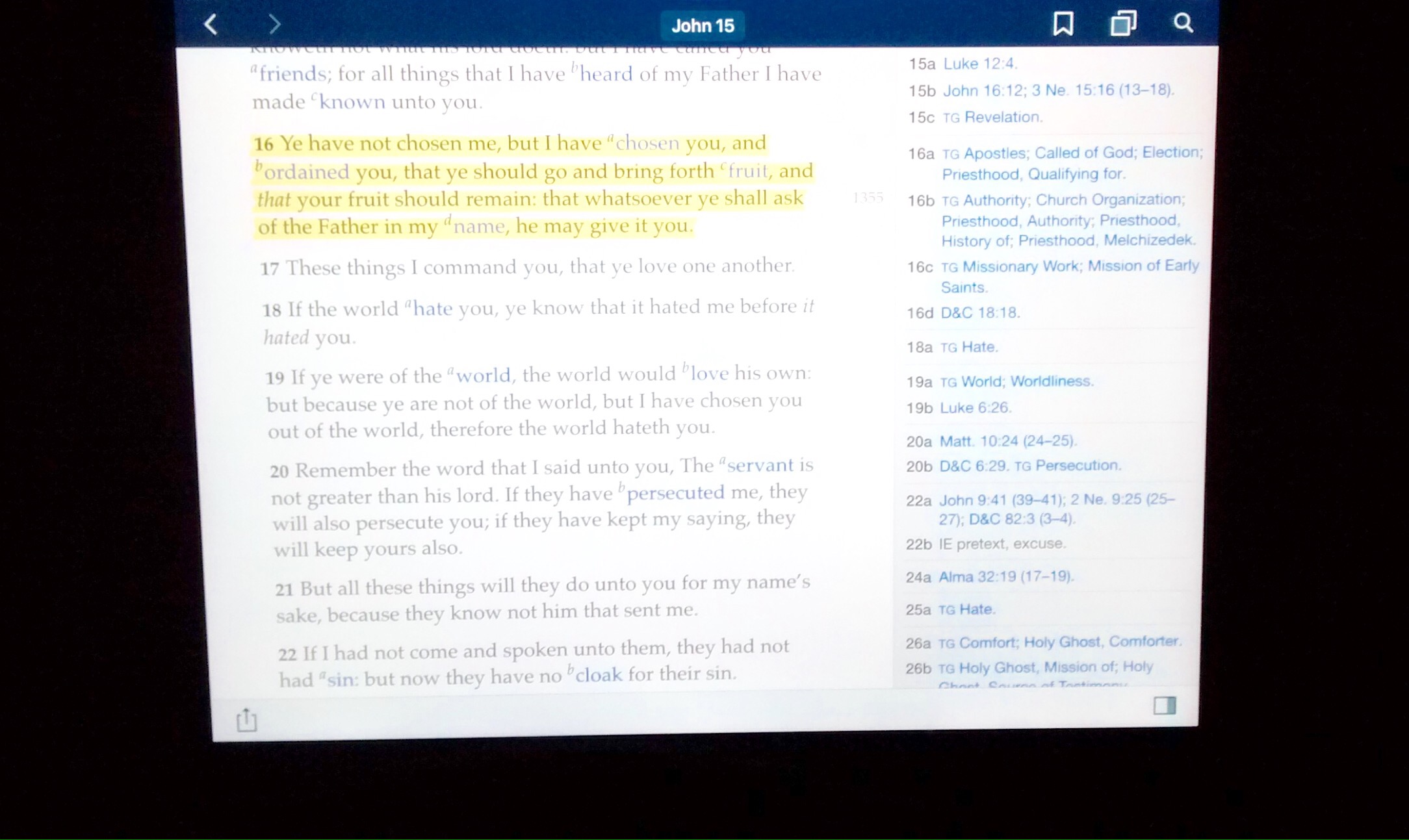
Ironically, in a low light situation, too much light is a problem. It’s why no one is bothered by you texting on your cell phone at a baseball game, but it’s very distracting when you do it at the movies. The light from the screen is the same, but the ambient light is different. (Actually, your phone is probably smart enough to adjust the brightness automatically. You may not have even noticed.)
Last year when I was doing a lot of work on my car, I had to replace a lot of burnt out bulbs in my instrument panel. The problem was not that I couldn’t see the dials at night. It was actually during the day that I couldn’t tell if I was going 30 MPH or 50. During daylight hours, your car’s instrument panel is much brighter than during the night time hours. It has to be brighter to compensate for the brightness of sun.


In our jobs, what is often “intuitive” is also often wrong. For example, email sent to my work account goes through a number of filters. There’s a corporate spam and virus filter. Then, there’s a mailbox filter. There’s also a filter on my computer. All are designed to restrict email. But, it’s that restriction that actually make my mailbox more useful.
My kids adopted electronic devices this year. They are finally old enough to pay their own cell phone bills. They are busy loading their phones and iPods with tons of games and apps. I’m sure they will soon come to me complaining about speed. Again, the non-intuitive answer is that after a certain amount, the more you load onto your device the less effective it become. Less is more.
I quickly found the scripture that the speaker was referring to and then adjusted the brightness on my iPad, reducing it to just a fraction of it’s full brightness.
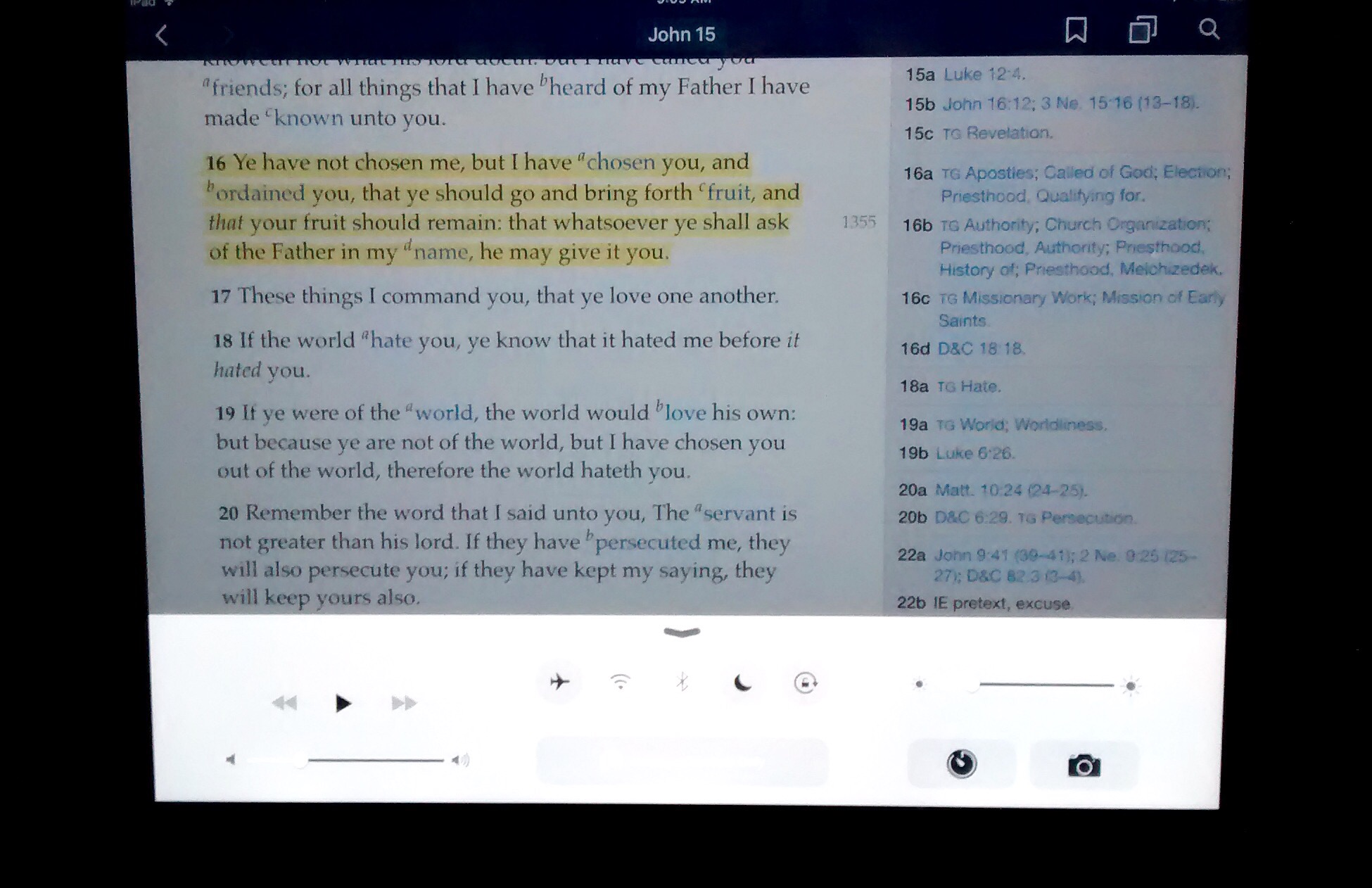
Jesus is the light, but I’m not sure He meant it quite that literally.
Rodney M Bliss is an author, columnist and IT Consultant. His blog updates every weekday at 7:00 AM Mountain Time. He lives in Pleasant Grove, UT with his lovely wife, thirteen children and grandchildren.
Follow him on
Twitter (@rodneymbliss)
Facebook (www.facebook.com/rbliss)
LinkedIn (www.LinkedIn.com/in/rbliss)
or email him at rbliss at msn dot com(c) 2016 Rodney M Bliss, all rights reserved
Hey kids, it’s snowing!
Does that sentence bring cries of excitement or groans of dread from your kids? For my kids, the answer is “Yes.” It really depends on the calendar.
Is a job promotion a good thing or a bad thing?
Yes.
Is an unexpected business trip a positive or a negative?
Yup.
Is getting a new member of your team a cause for exclamations of relief, or muttering of frustration?
Absolutely.
Events don’t happen in a vacuum. (Well, some vacuum events involving dust and sucking up those little Lego pieces do, but that’s not the kind of vacuum we are discussing.) Timing is everything. And just because an event might be a positive at one point in your life or career, doesn’t mean it is great other times.
How could a promotion be a bad thing? If it pushes you into a direction you don’t want to go, or don’t have skills in. I once was hired to manage a team of engineers. My first day on the job I realized that one of the engineers was fairly well known in our industry. He’d written multiple books and was regarded as one of the foremost experts in the world. My thought was, “Why didn’t he get the manager job?” I later found out, he did. And he hated it.
The skills that make you a good engineer, are not necessarily those that make you a good manager. This guy was great at being an engineer, but he was miserable in a management role. The company realized the mismatch and “demoted” him back to being an engineer. He was thrilled. It was almost like a promotion.
I think most people can understand how unexpected travel can be a negative, but can it be a positive? I was living in Chicago and working as an unpaid volunteer for the LDS Church. I was one of those guys you see in white shirts and ties who ride around on bicycles. Except, we were on busses and trains. I’d spent 18 months in Chicago and anticipated spending the remaining months of my missionary service in the Windy City. I was surprised one January when I was informed that the following week I would be transferred to Aneheim, CA. The weather was going from -8 to 80 for me. That was a good switch.
Okay, but what about a new team member? Don’t we all want more people to help on our teams? You know, share the load? There have been times in my career where I have turned down additional resources. Sometimes, they are simply too junior to be able to effectively contribute in the timeframe I need them to. Other times, there have been personality conflicts. “Bob’s not working out in accounting. Let’s transfer him to Rodney’s team!”
Most of the time I love adding people to my team. I’m a people person and really enjoy working with just about everyone. However, a new person means change. It means taking time away from your everyday tasks to bring the new person up to speed on processes, documentation, objectives, etc. If you are at crunch time in a project, the time when having another person would be the most helpful, it’s actually the time they are least effective.
Oh, and snow? During November and early December my kids are hugely excited at the first hint of the white stuff. By January, all they want to know is if there is enough that they will have to shovel the walks. . .again.
Timing is everything.
Rodney M Bliss is an author, columnist and IT Consultant. His blog updates every weekday at 7:00 AM Mountain Time. He lives in Pleasant Grove, UT with his lovely wife, thirteen children and grandchildren.
Follow him on
Twitter (@rodneymbliss)
Facebook (www.facebook.com/rbliss)
LinkedIn (www.LinkedIn.com/in/rbliss)
or email him at rbliss at msn dot com(c) 2016 Rodney M Bliss, all rights reserved
He finally received it on May 31, 2002. It was a fairly common award but it was one that had eluded the partners in his film studio David Geffen and Jeffrey Katzenberg. Likewise some of the most successful men in the world lacked this on their resumes.
- Bill Gates – Founder of Microsoft
- Steve Jobs – Founder of Apple and Pixar
- Larry Ellison – Founder of Oracle Computers
- Mark Zuckerberg – Founder of Facebook
- Michael Dell – Founder of Dell Computers
- Sheldon Adelson – Super rich Las Vegas mogul
- Scott Walker – Governor of Wisconsin
- Rush Limbaugh – Most popular talk radio host
- Sean Hannity – Second most popular talk radio host
- Glenn Beck – Third most popular talk radio host
On the campus of Cal State Long Beach in 2002 world renowned filmmaker Steve Spielberg received his college degree by completing a Bachelor of Arts with an option in film/video production. Why would Spielberg, who at the time had won three Oscars, a half dozen Emmys, Golden Globe awards and even five honorary doctorates, bother to go back to college?
As you consider that question, a more interesting question might be should you go back to school? To finish a bachelors? Get a masters? Get a doctorate?
He was one of the most dominating centers to ever play professional basketball. Known by a variety of knicknames, he was always Shaq. He earned four NBA championships. He went to 15 All-Star games. He was the NBA Finals MVP three times. He was the All-Star game MVP 3 times. And yet, just a year after retiring from professional basketball, he added one more honor. The guy who often sounded like he was swimming in the shallow end of the gene pool walked across the stage at Barry University in Miani, FL. He wasn’t there to get his Bachelors, nor a Masters. He was being awarded a doctorate in Education.
Why? Why would these men who were at the height of their professions subject themselves to the rigors of college coursework?
Both cite a promise to their parents.
One, I promised my parents I would [follow my passion for education]. Two, I wanted to continue my education and three I wanted to challenge myself.” – Dr. Shaquille O’Neal.
Spielberg offered this explanation,
I wanted to accomplish this for many years as a thank-you to my parents for giving me the opportunity for an education and a career. And as a personal note for my own family– and young people everywhere– about the importance of achieving their college education goals.”
My friend Darren is a senior manager in a bank. He recently completed an MBA program. His coworkers thought he was crazy. They didn’t understand why he would subject himself to that trouble of earning a degree that would not necessarily help him immediately advance in his career.
The IT industry is constantly reinventing itself. Every year our collective body of knowledge goes through a birthing and dying cycle. New processes, new products, new standards are released. And some knowledge that was the height of technical innovation just a few years earlier is unceremoniously laid to rest. The IT industry is the least sentimental, I’ve ever seen. We eat our young without a second thought. Yesterday’s technologies are dropped as we chase the latest and greatest. You might be cutting edge in your adoption of technology. There’s a step before cutting edge. The industry often embraces the bleeding edge.
There are always opportunities for growth and learning. Sometimes it’s certifications. I added CompTIA A+, Network+ and Security+ certifications last year. Ironically as soon as I earned them, a three year countdown timer starts until they are obsolete. However, as techies, we also have the opportunity to do what Speilberg did, to go back and finish an incomplete bachelors degree. Or do what Dr. Shaq did and go on to pursue higher degrees. Part of the appeal is to keep current, but there is a joy in learning for it’s own sake. And if you haven’t finished your degree, there is the feeling of unfinished business.
Spielberg’s professors said that while he didn’t attend classes, he did all of the work. . .with one exception. Instead of requiring him to submit a 12 minute polished film, they allowed him to reuse one of his existing films, the academy award winning Schindler’s List.
If you have unfulfilled education goals, what’s stopping you?
Rodney M Bliss is an author, columnist and IT Consultant. His blog updates every weekday at 7:00 AM Mountain Time. He lives in Pleasant Grove, UT with his lovely wife, thirteen children and grandchildren.
Follow him on
Twitter (@rodneymbliss)
Facebook (www.facebook.com/rbliss)
LinkedIn (www.LinkedIn.com/in/rbliss)
or email him at rbliss at msn dot com(c) 2016 Rodney M Bliss, all rights reserved
I am happy to join with you today in what will go down in history as the greatest demonstration for freedom in the history of our country.
Several years ago, I gave a speech about one of the greatest events in our nation’s history. Today, as much of America pauses to honor Martin Luther King, seems like a good time to share it again.
————————————————————————————————————–
From Dream to Reality
(April 16, 2013 – Rodney M Bliss)
I want to take you back to August 28, 1963. It was a brutally hot summer that year. A summer that seethed not just with the heat of high temperatures, but high tensions. A summer wracked not just with conflicted politics, but with conflicted people.
On this day the national mall in Washington DC is crowded to overflowing. A crowd a quarter million strong, predominately Black, have come to Washington today. Come to hear a speech that will define not just a movement, but a generation.
Come with me for a few minutes to revisit that pivotal day and the remarkable speech that forever defines it.
A young Black preacher steps to the microphone,
“I am happy to join with you today in what will go down in history as the greatest demonstration for freedom in the history of our nation. “
He speaks for nearly 20 minutes and my poor efforts pale next to his soaring oratory. He shares both his condemning view of our past and his prophetic hopeful vision for our future.
His voice spans the nation, telling us to
“Let freedom ring from the prodigious hilltops of New Hampshire.”
“Let freedom ring from the mighty mountains of New York.”
“Let freedom ring from the heightening Alleghenies of Pennsylvania.”
“Let freedom ring from the snowcapped Rockies of Colorado”
“Let freedom ring from the curvaceous slopes of California. Not only that, but let freedom ring from Stone Mountain of Georgia and Lookout Mountain of Tennessee.”
He tells us
“the Negro will never be satisfied, as long as our bodies, heavy with the fatigue of travel cannot gain lodging in the motels of the highways and the hotels of the cities. We cannot be satisfied as long as the Negro’s basic mobility is from a smaller ghetto to a larger one. We can never be satisfied as long as a Negro in Mississippi cannot vote and the Negro in New York believe he has nothing for which to vote. No, no, we are not satisfied, and we will not be satisfied until justice rolls down like waters and righteousness like a mighty stream.”
He has no way of knowing about a young Black boy growing up in Honolulu, Hawaii. A little boy who had just celebrated his 2nd birthday. The son of a white mother and a Black father. A boy who would someday not only gain lodging in the motels of the highways and the hotels of the cities, but would gain lodging in a house that while less than a mile from the spot where he stood, must have felt as inaccessible to that preacher as the surface of the moon.
Rather than walk the streets of slums, this boy will tread the halls of power. Rather than question for what to vote, he will be the one for whom they vote.
For over 150 years the Black man had waited for the nation to honor the promissory note that all men are created equal. But less than 50 years later, the first Black president would stand on the shoulders of these giants to reach the heights of achievement. Dream indeed.
You are no doubt familiar with the most famous lines from the speech that day,
“I have a dream that my four little children will one day live in a nation where they will not be judged by the color of their skin, but by the content of their character.
I have a dream today.”
Great as this sentiment is, it’s the next paragraph that makes this speech particularly personal, poignant and inspirational for me.
“I have a dream that one day the state of Alabama, whose governor’s lips are presently dripping with the words of interposition and nullification, will be transformed into a situation where little black boys and black girls will be able to join hands with little white boys and white girls and walk together as sisters and brothers.
I have a dream today.”
Each night as I look at the faces of my children gathered around our dinner table, or kneeling with their heads bowed to pray, I’m grateful that my little Black boys and black girls can join hands with my little white boy and white girls, as well as little Asian boys and Asian girl and walk together as sisters and brothers. Dream indeed.
We still have a long way to go as a nation to recognize and realize Dr. King’s dream. But for me and my family, his dream has become my reality.
Thank you
————————————————————
A video of my speech is available here.
The full text of Dr King’s remarkable speech can be found here.
The video of his entire speech can be found here.
Rodney M Bliss is an author, blogger and IT Consultant. He lives in Pleasant Grove, UT with his lovely wife and thirteen children, three of whom are white, three of whom are Asian and seven of whom are Black.
Follow him on
Twitter (@rodneymbliss)
Facebook (www.facebook.com/rbliss)
LinkedIn (www.LinkedIn.com/in/rbliss)
or contact him at (rbliss at msn dot com)
Some people think I’m perhaps a little harsh in my attitude toward the lottery. (You Didn’t Win, Lucky You!) It is true that your odds of winning the jackpot were zero. (Bill Gates And Mark Zuckerberg Will Give You The Powerball Lottery) But, I don’t think you wasted your money. Okay, maybe if you blew $1000 buying tickets, that’s a little excessive, but if you spent $2, $8, $20? It may have even been a good investment.
We are a story loving species. Sales people know this.
Facts tell
Stories sell
I recently saw this meme attributed to Alan Rickman.
Some of the most important stories are the ones we tell ourselves. The need for stories is why we flock to the movies. A movie ticket will run you anywhere from $20 for an IMAX experience to $2.00 at a discount theater. What do you get for that $2 or $8 or $20 ticket? You get a couple of hours of suspended disbelief. You know it’s not real, you aren’t flying through space in the Millenium Falcon, or stuck on Mars with Matt Damon. Matt Damon’s not even stuck on Mars with Matt Damon. But, we allow ourselves to dream for a couple hours. And we are willing to pay for the privilege. Eventually, the story ends, the lights come up and we have to go back to reality of work, kids and the responsibility of our bills. But, for those couple of hours, we were Jedi, or astronauts, or insanely rich.
And that is exactly why buying a Powerball ticket isn’t a waste of time. For your $2 or $8 or $20 you got more than just a couple of hours. For days, you could suspend your disbelief and imagine what life would be like if you had immense wealth. You knew that you weren’t going to win. Just like you knew that Matt Damon wasn’t really on Mars. But, there was no harm in enjoying the fantasy for a few days. Eventually, the story ended, the numbers came up and they weren’t yours and you had to go back to the reality of work, kids and the responsibility of your bills. But for a few days, you were someone else; someone who didn’t have money worries. Someone who was insanely rich.
It was a really good movie, and you were the star. And that’s worth a lot.
Rodney M Bliss is an author, columnist and IT Consultant. His blog updates every weekday at 7:00 AM Mountain Time. He lives in Pleasant Grove, UT with his lovely wife, thirteen children and grandchildren.
Follow him on
Twitter (@rodneymbliss)
Facebook (www.facebook.com/rbliss)
LinkedIn (www.LinkedIn.com/in/rbliss)
or email him at rbliss at msn dot com(c) 2016 Rodney M Bliss, all rights reserved

